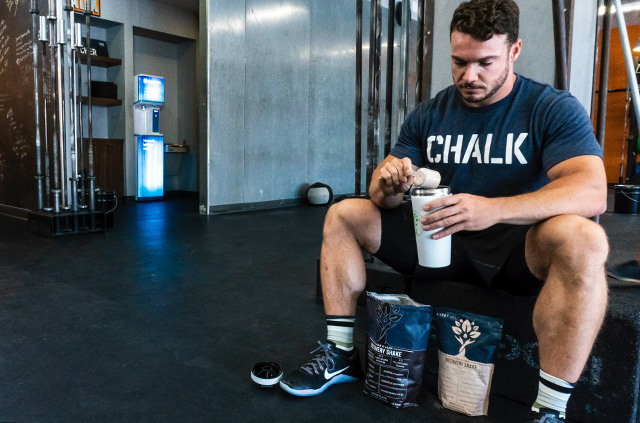Protein powder comes in so many different types and products that it’s easy to get overwhelmed. However, just because it’s difficult does not mean that finding the best protein powder and how to get the most out of it isn’t worth it!
We’ll explain everything you need to know in our breakdown, “Fueling Success: The Ultimate Guide to Protein Powder Usage.”
Continue reading as you’ll gain insight into how to use protein powder. We’ll answer the top questions about this supplement, from the basics like what protein powder is to the more applicable questions about doses and application. With so much to go over, let’s get started.
 extra protein for bodybuilding
extra protein for bodybuilding What is Protein Powder?
Protein powder is a supplement that takes the most protein-rich, edible compounds In our world and breaks them down into powders that easily dissolve in water. Protein is like a cellular building block; everything in our body, from muscular tissue to skin, is made of and benefits from protein.
Protein powder can contribute to muscle recovery, higher levels of energy, and the packing on of muscle. For this reason, many fitness enthusiasts use it in pre-workouts or post-workouts.
While protein can be gained by eating protein-heavy foods like chicken, eggs, or some types of dairy, it is gained more easily through these supplements. There are several different kinds of supplements which we’ll dive into below.
Whey Protein Powder
Whey protein powder has been described as the most common protein powder out there. Part of its benefits include being easily dissolved in water for a variety of recipes and having a complete profile of the 9 amino acids that are essential to a good source of protein.
The main benefit of whey protein powder is found in its speedy contribution to building muscle and repairing it after a workout.
Whey protein is made from one-half of the ingredients used to make cheese. When milk is used to create cheese, enzymes are added to it to separate curds, which are used to make cheese, from another liquid called “whey.” This whey is protein-rich, and once it is pasteurized, that protein is isolated to be used in a powder form. It is worth noting that whey is dairy-based.
There are a whopping three kinds of whey protein powder, which we’ll examine below.
- Whey Protein Concentrate – This protein is made up of about 75% protein, while the rest of it is usually made from lactose and fats. Those ingredients create a taste that the majority of supplement users prefer in their protein shakes and smoothies.
- Whey Protein Isolate – This protein powder is made of much more protein, in ingredient profile, than whey protein concentrate. It has very little lactose and fat, so it doesn’t taste quite as pleasing, but it has more “bang for your buck’’. But, as with many other supplements, many options are on the market, making it difficult to choose. We found a list that presents the best whey protein isolate powders.
- Whey protein hydrolysate – This type of protein is actually pre-digested, meaning that it is more easily digested and basically works a bit faster than the other two whey proteins. It is also higher in protein content, with only 1% of its content devoted to taste. As a result, it is very bitter and has a pronounced taste that’s hard to hide.
Being one of the most common and popular kinds of protein powder, whey protein is easily found in any supplement store and most grocers.
Soy Protein Powder
Soy protein powder is known as a dairy-free alternative to whey protein powder. While whey protein is made from cheese, soy protein powder is created when a soybean has been stripped of its hull and processed free of its fat content. It’s actually been around since 1959 and is helpful in building muscle, but not quite as effectively as whey protein.
Instead, the main benefit of soy protein powder is in controlling certain levels of the body’s function. The primary level is weight; soy protein can aid in the control of blood sugar, and this is most helpful when someone is trying to lose weight. This is because soy protein powder induces insulin production so that the body has better control over blood sugar.
That being said, soy protein is also excellent for boosting the power of an immune system and can contribute, like all proteins, to raising energy levels. Soy protein is commonly found wherever whey protein is sold so customers with dietary restrictions have this option: look for it in supplement stores and grocery stores.
Casein Protein Powder
Finally, casein protein powder is another dairy-based protein powder that is slightly less well known than its two counterparts. Casein protein powder is made from milk. It is highly filling and is therefore useful when someone wants to control their eating habits. This is because casein protein powder is denser and digests at a slower rate than whey or soy.
One downside to casein protein powder is that it is a bit thicker than whey protein and doesn’t dissolve quite as easily in liquid. However, this doesn’t stop casein protein powder from having incredible benefits for muscle recovery.
Overnight, casein protein powder contributes to leucine, which is an amino acid, and essentially keeps feeding your muscles the energy they need to recover from intense workouts. This is especially helpful because it can keep your muscles from atrophying. It is slightly difficult to find compared to whey and soy powders, but it is easier to find online or in supplement stores.
Collagen Protein Powder
Collagen Protein powder is not commonly used for workouts or meal replacements. This is because, although it is made from a substance that the human body greatly benefits from, it isn’t great for growing muscles or recovering muscles.
What collagen protein powder is commonly used for is to supplement the diet with collagen, itself. This makes sense when you realize that collagen protein powder contributes to healthy skin, strong joints, and better digestion. It can also be found in supplement stores, online, or in grocery stores.
How Much Protein Powder Should You Use?
Protein powder typically comes with its own optimal suggestions for doses. It is usually recommended that you take only 30 grams of protein because it will contribute to leaner muscle and less body fat. We’ll break it down a little further for you below:
- To Gain Muscle and Recover – After a workout, you’ll want to take 1.6 grams of protein for every kilogram you weigh each day.
- To Succeed in Resistance Training – Take at least 0.8 grams of protein for each kilogram you weigh every day. This will help you keep your muscle mass.
- To Avoid Over-Eating Protein Powder – After your body adapts to taking 1.6 grams of protein powder, it’s a good idea to lower your intake to 1.2 grams per kilogram of your weight per day. This is because too much protein can lead to a strain on the kidneys, bad digestion, and even dehydration.
In Conclusion
To sum it up, fueling success is achieved through understanding how protein powder works and using it to the advantage of your personal goals. For example, if you can tolerate dairy and are hoping to build up muscle, 1.6 grams of whey protein a day is your best bet.
However, if you can’t have dairy or are looking to simply control your weight, soy protein is a better alternative. Finally, if you need to stabilize joints and fill up, casein protein powder is the optimal choice.
Select the best protein powder for your goals, and apply your knowledge of how it works to your own pre or post-workout routine for incredible results!
Related Pages
- Protein and Athletes
- Protein Powders - what is a food and what is a supplement?
- Are Amino Acid Supplements Necessary?
- Protein Loading: Do You Eat Too Much?
- Choosing a Protein Bar
- Supplements and Weight Gain — a brief outline


 Current Events
Current Events